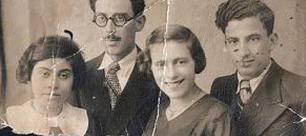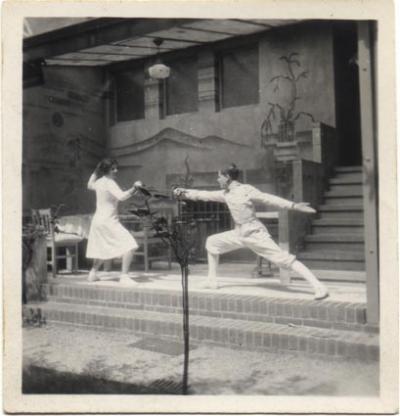From the Centropa Biographies - Lea Merényi

Lea Merényi
Born 1914 in Budapest
Country: Hungary
City: Budapest
Interviewer: Gábor Gondos
Year of interview: 2004

Lea Merényi and her brother István at their grandparent’s garden in Barmen, Germany
We got on [the train] and they took us somewhere. We didn’t know where, nobody told us. Until there was food, we ate, until there was something to drink we drank. Then there wasn’t anymore, and we didn’t eat or drink. Once we asked for water from one of these guards; he brought us some from somewhere, and that was oily. There wasn’t a toilet there of course, so the train stopped from time to time, and they let us out, and we relieved ourselves in the cornfields. The weather was rainy and there were puddles everywhere, and we could wash ourselves a little. Otherwise we couldn’t have a wash. This entertainment lasted for about two weeks, because the Germans kept putting us here and there. I found out later that the Germans were already in quite a big trouble, because they didn’t have enough cars to transport their own troops, and that’s why they shuffled the cars hither and thither. But we were lucky, because our transport was one of the last ones.
They made us get off the train in Bergen-Belsen, and from the railway station we went on foot for a very long time, I have no idea for how long. We didn’t know that we got to the relocation camp. And we went in because they told us to go in. We had no idea about anything. Then we saw that there were a lot of barracks. Then we kept going for a while alongside the barracks. In the end they drove us into one of them, the entire transport from Budapest in one barrack. It was jam-packed. My sister and I only had a plank-bed with a straw mattress for a while, so we slept head to toe on a bunk-bed. The bunk bed was so small that if the person on the upper bed hung his foot down from above, it reached the mouth of the person below.
Then ‘Lager’ [German for camp] life began, which was strange because they never took us to work anywhere, this was a relocation camp. But they gathered us into a so-called ‘Sonderlager’ [special camp], so there must have been some truth in the medicine exchange story. Once they took us on a walk somewhere, and then I held my sister’s hand and I said that the gassing was going to come. But they didn’t take us there, they took us on a walk.
We only got a minimal amount of food. They were careful though so that we wouldn’t die. There were big brown enameled washbasins, they put everything in those. There was the horrible dishwater that they gave us, and when they distributed the food they commanded ‘bowl down!’, then we banged this washbasin-like thing down, and they poured some food in it with a big ladle. I don’t remember what was in it, but I know that tiny pieces of bacon were floating in it, and I gave them all to my sister. I wanted her to eat it, because she was growing, and I wanted her to get out of this safely. There were long, brick-shaped loaves of bread, and they sliced those up. My sister wrote down on the margin of a drawing, because she was accurate, that a loaf of bread was 24 centimeters long and weighed 150 grams, and they cut those in slices. So we weren’t overfed.
All kinds of ‘skillful’ people [deportees] took from that awful soup, too. There were some who stole bread. That was the capital sin. We put those who stole bread under a ban, we never talked to those again. There was swapping, too. There was someone, I can’t forget this, who gave away all her bread in exchange for a cigarette. This meant death. She couldn’t give up smoking. So such things happened. We didn’t swap.
One of our friends didn’t have her hair cut, and she combed it every day. She had a comb because of the lice. There were all kinds of animals which climbed on us. We kept looking at our clothes to see whether there were lice on them or not. There were some who were taken to work at the weaving mill. But it was forbidden for them to take us, because then we would have gotten weak and wouldn’t have been good exchange goods. So we didn’t work. Once they gathered us in a huge group and took us on a walk, or rather to collect brushwood. But we made a walk out of this. We didn’t collect brushwood but violets.
The Bergen-Belsen camp was a military camp originally. The former military washroom was still there, where the water came from these showers and we could get there through the mud. Once an over-anxious guard yelled at someone to behave like a soldier [i.e. be strong and not whine and complain]. Perhaps the Bergen-Belsen camp erased many things from my memory, because at that time I didn’t focus on anything else but to bring my sister back to my mother safely.
And we set off on foot. That’s how we later got to a deserted German town of clerks, to Trobitz [in Brandenburg province]. There was a block of apartments, and we could go into these clerk houses. We got a room, and my sister fell ill with typhus, which I managed not to get. I nursed her, and I didn’t contract it from her. The Russians were very kind - because the Russians were already there at that time - and we got a big pot of chicken soup with noodles every day, and I could feed my sister with that. So she recovered.
My sister, the three other girls and I, I don’t know why and how, separated from the others. We continued on our way on the main road. Food was a problem, it was a constant problem to figure out what to eat and drink. We were sure, that even if barefoot we would still go home. I remember that there were the five of us, a small group: my three friends, my sister and I. One of my friends fell ill with typhus in the camp, she couldn’t walk. Then we got hold of a small wheel barrow, something that could be pulled by hand, and we made her sit in it and pulled her by turns. But she needed to drink milk. So we went to ask for milk. I was in a German house to beg for milk for my friend, because that’s how we ate, out of alms. And both of us spoke German fluently, and all the Germans believed that we were German refugees. That’s how we got hold of food. We always got something. I know that once I came home with a big loaf of bread, the five of us had enough to eat.
I don’t know for how long we kept wandering, always eastward, but we wandered for a few weeks, until we got home. When we came across a train by accident, we asked where it was going. If it went eastward we got on, but there wasn’t any kind of system in this. The liberation was still very new. I even met a Russian soldier on the field, and I didn’t realize that it was a Russian soldier. I asked him what he wanted. He said that he wanted my watch, because I still had it. My sister told me later that I was stupid, because that was a Russian. My sister and I had an agreement on the way home from the camp, from Bergen-Belsen, I remember it exactly, that we would pretend nothing had happened and continue our life from where we had left off. Of course it didn’t happen that way, but this was our plan.
Our apartment was occupied, we couldn’t move in. A distant aunt of ours lived on Andrassy Avenue. She had a quite big apartment on the second floor, we knew that. So we went to her place and asked her to accommodate us in her apartment. And she did.
The Jews had a search service, and my sister went there to give the details, and ask them to look into them, but they didn’t find anything. I don’t know what this search service was called, but the Jewish Community, the Sip Street center supported it. But otherwise I have never been there, my sister only went there once, when she asked about this. I only know about my mother that she got to the ghetto, to a family we knew. There she fell ill, probably of influenza, there was no medicine and she died. I don’t know what the Hungarian ghetto was like, but it probably wasn’t a piece of cake. My sister and I came home from the deportation determined to find our mother first. That helped us endure everything.
Considering the fact that I’m not getting any younger, my brain is still sound, only my memory got worse. This has always been my weakness. I remember so imperfectly, there’s nothing to do about it. Sometimes I think of my brother, and I think of my grandparents, unfortunately it still stirs my fantasy, I always have to talk myself out of it.

Lea Merényi at the Lake Balaton, Hungary
